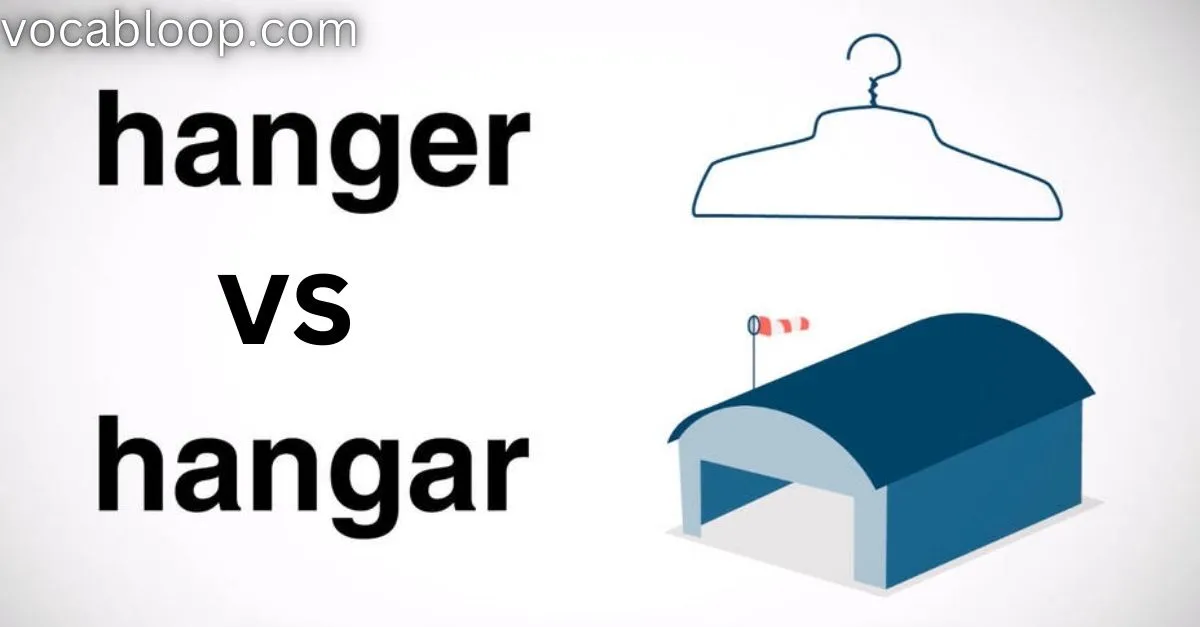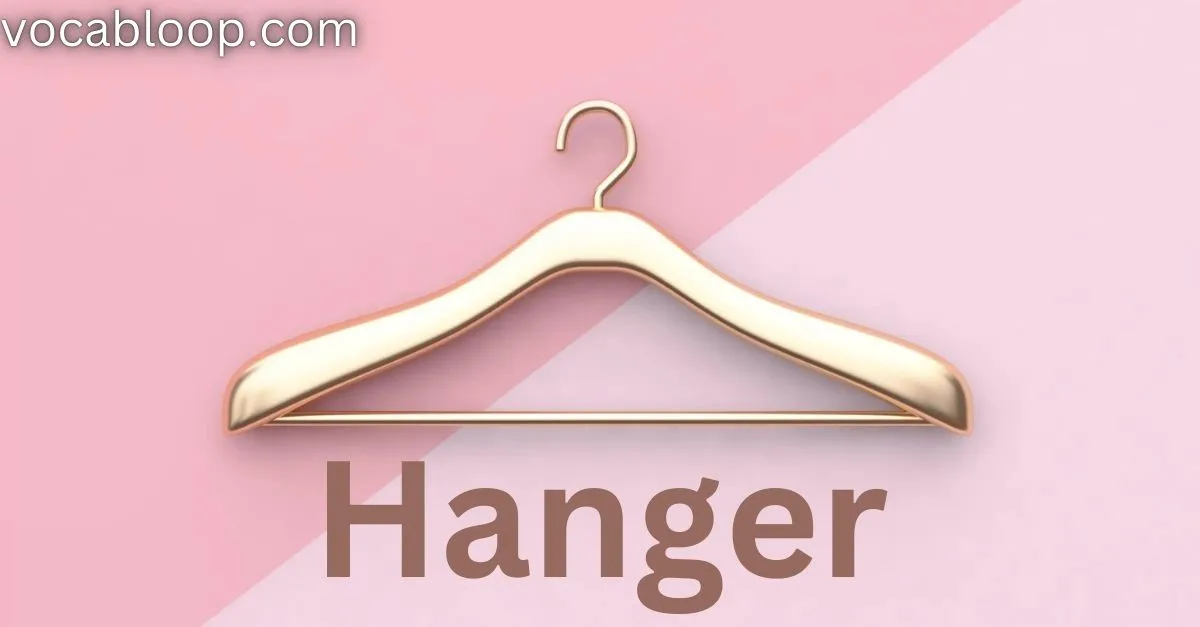When it comes to commonly confused words, “hangar” vs “hanger” are two that often trip people up. They sound almost identical but carry very different meanings. A hangar refers to a large structure used in aviation to store or maintain aircraft, while a hanger is a domestic tool found in wardrobes, used to hold clothing.
Understanding their distinctions requires exploring their definitions, context usage, and origins. This guide will help you master the hangar vs hanger meaning, providing clarity, examples, and practical tips.
What is the confusion between Hangar vs Hanger?

The confusion arises from their identical pronunciation as homophones, making them easy to mix up in both speech and writing. The key difference lies in their usage: hangar is an aviation term, while hanger belongs to the realm of closets and laundry. Imagine saying, “The airplane is stored in the hanger,” or “Pass me the hangar for my coat.” Such errors are not only incorrect but can also make your meaning unclear.
This misunderstanding is common because both words are nouns, and their spellings differ only slightly. However, their context usage is worlds apart. A hangar refers to a storage building for aircraft, often seen in airports or military bases, whereas a hanger is essential for closet management and keeping clothes tidy. By understanding their distinctions, you can avoid these misused terms.
What is a Hangar?

A hangar is a large structure used in aviation to store, maintain, and repair aircraft. These buildings are designed to accommodate the unique needs of airplanes, providing protection from the elements and a space for engineers to work on repairs and inspections.
Hangars are typically made of durable materials like steel or concrete, and they often feature large doors to allow aircraft entry and exit. They are crucial for aircraft storage and are commonly found at airports, military bases, and private airfields.
Is the Hangar Word Correct?
Yes, “hangar” is correct and frequently used in aviation. A hangar is a large structure designed to shelter aircraft. These buildings are integral to the aerospace industry, functioning as storage spaces, aviation engineering facilities, and maintenance hubs. Without hangars, airplane upkeep and aircraft repair would be impossible.
Definition:
A hangar is a noun that refers to a building where aircraft are stored, repaired, or maintained. It is commonly constructed with durable materials like steel or concrete.
Meaning:
The hangar meaning extends beyond simple storage; it involves creating a safe environment for aircraft maintenance. Hangars often serve as workshops where engineers perform repairs, upgrades, or inspections.
Usage:
In practical scenarios, hangars are pivotal in the aviation world. For instance, a mechanic might say, “The jet is parked in the hangar for its routine inspection.” Such spaces are essential for housing large aircraft during bad weather or long-term storage.
| Key Features of a Hangar | Details |
| Function | Aircraft storage, repair, and maintenance |
| Materials | Steel, concrete, or composite materials |
| Common Types | Military hangars, private hangars, airport facilities |
| Related Term | Airplane shelter |
| Example Use | “The helicopter was moved to the hangar.” |
What is a Hanger?

A hanger is a tool used in domestic settings, primarily in closets, to hold and organize clothes. It allows garments to be hung neatly, preventing wrinkles and maintaining their shape.
Hangers come in various materials, including plastic, wood, and wire, and are designed for specific types of clothing—such as padded hangers for delicate fabrics or sturdy wooden hangers for suits. They are essential for keeping closets tidy and making clothes easily accessible.
Is the Hanger Word Correct?
“Hanger” is equally correct but relates to a completely different context. A hanger is a garment organizer, a simple tool used in domestic settings like wardrobes or laundry rooms. Hangers are essential for keeping clothes neat, preventing wrinkles, and organizing garments efficiently.
Definition:
A hanger is a noun that refers to a device designed to hold clothing. Garments are stored in a tidy, accessible manner using a hanger in closets.
Meaning:
The hanger meaning revolves around its role in clothing storage. Whether it’s a wire hanger for light clothing or a sturdy wooden one for heavy coats, this tool is indispensable for closet management.
Usage:
For example, someone might say, “I need a new hanger for my jacket.” Different types of hangers serve various purposes, from laundry solutions to wardrobe tips.
| Types of Hangers | Purpose |
| Wire Hangers | Lightweight clothes |
| Wooden Hangers | Heavy garments like suits and coats |
| Padded Hangers | Delicate fabrics such as silk or lace |
| Plastic Hangers | Everyday use for shirts and trousers |
Quick Summary of Hangar vs Hanger
The table below provides a concise comparison of these commonly confused words, highlighting their definitions, contexts, and applications.
| Feature | Hangar | Hanger |
| Definition | Airplane shelter | Garment organizer |
| Usage Context | Aviation term | Domestic use |
| Example Sentence | “The aircraft is in the hangar.” | “I need a hanger for my shirt.” |
| Material | Steel, concrete | Plastic, wood, metal |
| Synonyms | Airplane facility, aviation shelter | Closet tool, garment holder |
Pronunciation of Hangar vs Hanger

Although “hangar” and “hanger” are homophones, their phonetics differ slightly. The hangar pronunciation emphasizes the “ar” at the end, while the hanger pronunciation stresses the “er” sound. Mastering their pronunciation helps with speech clarity and reduces errors in articulation.
- Hangar: \ˈhaŋ-ər\ (sounds like “hanging a-r”)
- Hanger: \ˈhaŋ-ər\ (sounds like “hanging e-r”)
Practicing these words in sentence examples can make their distinctions clearer.
Common Mistakes and How to Avoid Them
Common mistakes with “hangar” vs “hanger” often occur because of their similar sounds but different contexts. The most frequent error is using “hanger” when referring to an aviation term, like saying “The coat is in the hangar.”
To avoid confusion, always associate “hangar” with airplanes and “hanger” with clothes. Another mistake involves spelling—remember, the “ar” in hangar relates to aviation, while the “er” in hanger ties to “closer,” helping recall its role in domestic settings.
Origins of Hangar vs Hanger
Hangar:
The term “hangar” derives from the French word “hanghart,” meaning enclosure or shed. It evolved to refer specifically to aviation buildings in the early 20th century, reflecting its role in housing aircraft. Today, aviation contexts often use this term for facilities ranging from small private shelters to massive military shelters.
Hanger:
“Hanger” originates from the Middle English term “hangre,” connected to the verb “hang.” This connection explains its use as a clothing holder. Over time, it has become synonymous with tools used in domestic settings, like closets and wardrobes.
Trick to Remember the Difference Hangar vs Hanger
An easy mnemonic to remember the difference between “hangar” and “hanger” is: “Hangar for airplanes, hanger for clothes.” Picture a large aircraft safely stored inside a spacious hangar, and a coat neatly hanging on a hanger.
This mental image reinforces their distinct meanings—hangar for aviation storage and maintenance, and hanger for organizing clothes in wardrobes. It helps differentiate the terms and makes their proper usage clearer in your mind.
Synonyms of Hangar vs Hanger
Hangar:
- Airplane shelter
- Aviation building
- Aircraft storage
- Maintenance facility
- Military shelter
- Airplane facility
- Engineering facility
- Aviation term
- Storage building
- Aircraft repair center
Hanger:
- Clothes storage
- Closet tool
- Garment organizer
- Laundry accessory
- Wardrobe item
- Clothing holder
- Closet management tool
- Laundry solution
- Garment rack
- Wardrobe tip
Sentences in Daily Usage Hangar vs Hanger

Hangar
- We converted the old hangar into a workshop.
- We parked the plane in the hangar to avoid the storm.
- A larger hangar will store the new aircraft.
- The hangar doors opened, revealing the military jets inside.
- Engineers were able to repair the damage to the aircraft in the hangar.
- We built a massive hangar to accommodate the new fleet.
- The maintenance crew used the hangar as a workspace.
- Planes awaiting their turn for inspection filled the hangar.
- We use a smaller private hangar for maintenance and storage.
- The airshow featured a lineup of vintage planes in the hangar.
Hanger
- I need a sturdy hanger for my suit.
- The hanger broke as I tried to lift the coat.
- She organized her closet using color-coded hangers.
- A padded hanger is great for delicate fabrics like silk.
- The hanger rack held clothes waiting to be put away.
- I always use wire hangers for lightweight garments.
- The plastic hangers are ideal for everyday use.
- Hangers holding bags and hats lined the closet door.
- A wooden hanger adds a touch of luxury to the wardrobe.
- The hanger hook slipped off the rail, causing a pile of clothes to fall.
FAQs
What does “hangar” mean in aviation?
A hangar is a large building used to store and maintain aircraft.
Can “hanger” refer to aviation?
Clothes are hung exclusively on a hanger.
What’s an easy way to remember the difference?
Think “airplanes in a hangar” and “clothes on a hanger.”
Are there different types of hangars?
Yes, there are military shelters, private hangars, and commercial facilities.
Which word is more common in daily use?
“Hanger” is more frequent in everyday domestic settings.
Conclusion
The hangar vs hanger context highlights how important word meanings and usage are in achieving language clarity. By understanding their definition comparison, mastering their pronunciation guide, and applying the right word in the right context usage, you’ll never confuse these terms again.

Alex Hormozi is a seasoned blogger at Vocab Loop, known for his deep insights into language, vocabulary, and grammar. With years of experience in writing, Alex shares practical tips and effective strategies to help readers improve their linguistic skills and enhance their writing abilities.

